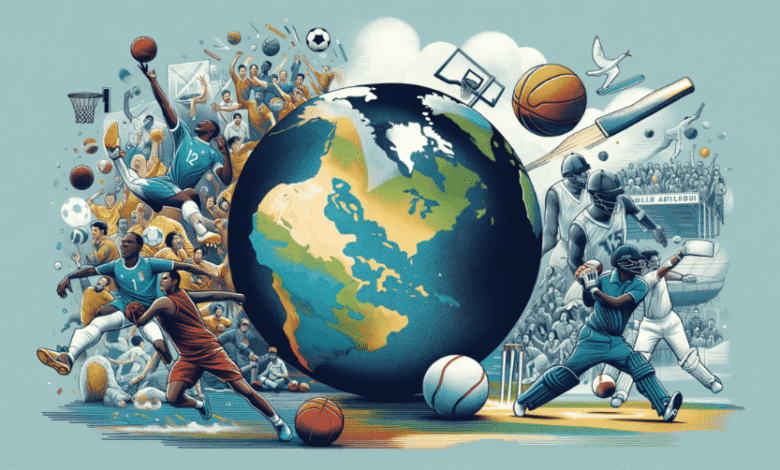The History of Popular Sports Around the World

Sports have long been a vital part of human culture, reflecting society’s values, ambitions, and spirit. From ancient rituals to modern-day global spectacles, the history of popular sports around the world reveals fascinating stories about our shared humanity. This article explores how sports evolved across continents, influenced national identities, and shaped the way we connect today.
Introduction to the Global Significance of Sports
Sports are more than just games—they are a universal language that unites people across borders and cultures. Popular sports such as football, cricket, basketball, and tennis have millions of followers, bringing communities together in celebration and competition. Understanding the history of these sports uncovers how they grew from simple pastimes into cultural phenomena with lasting impact.
Ancient Origins of Sports: From Rituals to Competition
The roots of sports reach deep into ancient civilizations where physical contests often held spiritual or social significance.
See also: prayerscore
Sports in Ancient Egypt and Mesopotamia
In ancient Egypt, sports like wrestling, archery, and swimming were part of both military training and entertainment. Similarly, Mesopotamian cultures enjoyed various games that combined athleticism with religious ceremonies, indicating sports’ early link to ritualistic practices.
The Influence of Greek and Roman Sports
The Greeks took sports to new heights, formalizing competitions as a way to honor the gods. The ancient Olympic Games, which began in 776 BC in Olympia, Greece, introduced organized events such as running, wrestling, and chariot racing. These games became a symbol of unity among city-states.
The Olympic Games: Birth of Organized Sports
The Olympics established foundational rules and fostered the idea of sportsmanship and fair play, values that continue to shape sports today. The Romans, inspired by Greek traditions, added gladiatorial contests and team sports like ball games to their cultural repertoire.
Traditional Sports and Their Cultural Roots
Many popular sports have deep cultural origins linked to the traditions and customs of specific regions.
Martial Arts in Asia: Judo, Karate, Taekwondo
Asian martial arts developed as forms of self-defense and spiritual discipline. Judo and Karate in Japan, Taekwondo in Korea, and Kung Fu in China have centuries-old histories rooted in philosophy, health, and combat techniques.
Indigenous Sports of the Americas
Indigenous peoples in North and South America practiced unique sports such as lacrosse and the Mesoamerican ballgame, which held ritual importance and were played in large community settings.
Traditional African Sports and Games
African cultures enjoyed various traditional games emphasizing agility, strength, and strategy, many of which influenced modern sports in Africa and beyond.
The Evolution of Popular Modern Sports
Modern sports largely took shape during the 19th and 20th centuries, influenced by industrialization, colonialism, and globalization.
The Rise of Football (Soccer) Worldwide
Football’s history dates back to medieval Europe, where different ball games were played in villages. The standardization of rules in 1863 in England paved the way for modern football.
Early Football Variants and Codification
The establishment of The Football Association introduced uniformity in rules, which allowed football to expand rapidly, becoming the world’s most popular sport.
Cricket’s Colonial Legacy
Cricket, originating in England, spread throughout the British Empire, becoming deeply rooted in countries like India, Australia, and the Caribbean. It symbolizes colonial history and contemporary cultural identity.
The Development of Basketball and Baseball
Invented in North America, basketball and baseball gained huge popularity through organized leagues and professional teams, shaping sports culture in the United States and beyond.
Iconic Sports and Their Historical Milestones
Certain sports have unique historical milestones that propelled them to global prominence.
Tennis: From Royal Courts to Global Arenas
Tennis began as a pastime for European nobility and evolved into a competitive sport with international tournaments like Wimbledon and the US Open.
Rugby’s Roots and Global Expansion
Rugby originated from football variations in England and developed into distinct forms such as rugby union and rugby league, widely played in countries like New Zealand and South Africa.
Formula 1 and the Evolution of Motorsport
The history of motorsport reflects technological innovation and entertainment, with Formula 1 emerging as the premier racing competition.
The Role of Sports in Shaping National Identity
Sports often mirror political and social dynamics, becoming platforms for expressing national pride.
How Sports Reflect Political and Social Change
From apartheid-era South Africa’s rugby struggles to the Cold War Olympics, sports have been arenas for conflict, diplomacy, and cultural exchange.
Major International Competitions: FIFA World Cup, Olympics
Events like the FIFA World Cup and the Olympic Games serve as global stages where nations showcase talent, culture, and unity.
The Impact of Technology on Sports History
Technology has transformed how sports are played, viewed, and managed.
Advances in Training and Equipment
Innovations in sports medicine, gear, and analytics have improved athlete performance and safety.
Broadcasting and the Globalization of Sports
Television and the internet revolutionized sports viewership, turning local games into global spectacles.
Future Trends in Popular Sports Around the World
The landscape of sports continues to evolve with new trends shaping its future.
Emerging Sports and Changing Preferences
Sports like pickleball, drone racing, and ultimate frisbee are gaining traction worldwide.
The Influence of Esports and Virtual Competitions
The rise of esports shows how technology blends with traditional sports concepts, attracting younger audiences globally.
Frequently Asked Questions (FAQs)
What is the oldest known sport in the world?
Wrestling is often cited as one of the oldest sports, with evidence dating back over 15,000 years in cave paintings.
How did the Olympic Games influence modern sports?
The Olympics introduced formalized competition, international participation, and values like sportsmanship, which shaped modern sports structures.
Why is football (soccer) the most popular sport worldwide?
Its simple rules, minimal equipment needs, and widespread adoption in many cultures contribute to football’s global popularity.
What role did colonialism play in spreading sports?
Colonial powers spread their native sports to colonies, embedding games like cricket and football into local cultures.
How has technology transformed sports globally?
Technology enhanced athlete training, fair play via instant replay, and broadened audience reach through broadcasting.
What future sports trends should we expect to see?
Expect more integration of virtual reality, greater diversity in sports types, and increasing focus on inclusivity and sustainability.
Conclusion: Celebrating the Rich History of Sports Globally
The history of popular sports around the world is a vibrant tapestry of cultures, traditions, and innovations. Sports continue to inspire, entertain, and unite millions, reflecting humanity’s enduring passion for competition and camaraderie.


